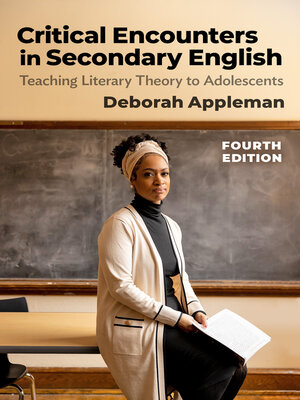Critical Encounters in Secondary English
ebook ∣ Teaching Literary Theory to Adolescents · Language and Literacy
By Deborah Appleman

Sign up to save your library
With an OverDrive account, you can save your favorite libraries for at-a-glance information about availability. Find out more about OverDrive accounts.
Find this title in Libby, the library reading app by OverDrive.



Search for a digital library with this title
Title found at these libraries:
| Library Name | Distance |
|---|---|
| Loading... |
Grounded in solid theory with new field-tested classroom activities, the fourth edition of Critical Encounters in Secondary English continues to help teachers integrate the lenses of contemporary literary theory into practices that have always defined good pedagogy. The most significant change for this edition is the addition of Critical Race Theory (CRT) as an analytical lens. CRT offers teachers fresh opportunities for interdisciplinary planning and teaching, as it lends itself to lessons that encompass a variety of disciplines such as history, sociology, psychology, and science. As with the previous edition, each chapter concludes with a list of suggested nonfiction pieces that work well for the particular lens under discussion. This popular text provides a comprehensive approach to incorporating nonfiction and informational texts into the literature classroom with new and revised classroom activities appropriate for today's students.
Book Features:
Praise for the Third Edition
"What a smart and useful book! It provides teachers with a wealth of knowledge and material to help their students develop critical perspective and suppleness of thought." –Mike Rose, University of California, Los Angeles
"This Third Edition proves that Appleman still has her hand on the pulse of the rapidly changing landscape of education." –Ernest Morrell, Teachers College, Columbia University
"This new edition of Deborah Appleman's now classic book demonstrates even more dramatically than previously how the critical theories she so skillfully teaches serve not only as lenses for the reading of literature, but as tools for discovering, interrogating, and challenging injustice, hypocrisy, and the hidden power relations that students are likely to encounter." –Sheridan Blau, Teachers College, Columbia University







